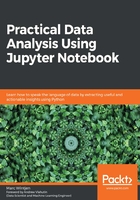
Foreword
It has been stated in many ways that society is producing more data than we have ever before and that we have just scratched the surface on figuring out how to make use of it. Whether it is truly the oil, or gold, of the 21st century, only time will tell but it is clear that being able to read it, mold it, and tell a story with it are skills that will be in demand for the foreseeable future. These skills turn data, facts, and figures, into information, knowledge, and insights gained from that data.
With the media grasping on buzzwords in the last few years, it may lead one to believe that working with data is a pretty new field. However, techniques have been introduced and perfected over decades on how to glean insight from the digital world. In a sense, it is only in the past decade that we have been able to apply these techniques at scale. These old but true best practices are almost technology agnostic and will help with whatever language or solution you are implementing. As you read on, it is exciting that you will not only get to learn the exciting technology used to gain intuition from data but also the knowledge of someone who has applied these lessons in a business setting. It is only by asking the right questions of the data does one get valuable information.
Some of these concepts that get lost in practice become the most important part of any data role. One learns quickly how asking where the source of the data is could be a key to understanding if one’s visualization makes sense. Missing or malformed data can lead to wrong conclusions and mistrust from the audience of any analysis. Applying the tools that you learn, will help in being confident that any artifact from your analysis will be sound and truthful.
Marc is a true advocate for data literacy and transparency. He knows the tricks to get the most out of the data and the questions to ask even before you get hands-on. I am confident that he will lead you through the journey well, and I wish you luck on your adventure.
Andrew Vlahutin
Data Scientist and Machine Learning Engineer